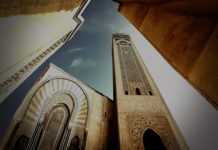Praise to be to Allah.
Allah commanded Jibreel to blow through the neck of Maryam’s garment, and this breath went down and by the will of Allah entered her womb, so it became a soul that Allah had created. Allah has explained how He created Isa (peace be upon him), as He said (interpretation of the meaning):
| And she who guarded her chastity [Virgin Maryam (Mary)], We breathed into (the sleeves of) her (shirt or garment) [through Our Rooh Jibreel (Gabriel)] [al-Anbiya 21:91] |
Then Allah explains that the Rooh reached her womb, as Allah says (interpretation of the meaning):
| And Maryam (Mary), the daughter of Imraan who guarded her chastity. And We breathed into (the sleeve of her shirt or her garment) through Our Rooh [i.e. Jibreel (Gabriel)]. [al-Tahreem 66:12] |
The ayah (interpretation of the meaning):
| (The angel) said: I am only a messenger from your Lord, (to announce) to you the gift of a righteous son [Maryam 19:19] |
indicates that the one who blew into her was Jibreel, who does not do anything except by the command of Allah.
Some commentaries have been narrated from some Mufassireen (commentators) suggesting that her pregnancy lasted only a few seconds, but this is not clearly indicated by the texts. If that had been the case, it would have been a miracle in and of itself: people would have accepted that this was not a normal pregnancy as experienced by women, and they would not have accused her of fornication, as they said (interpretation of the meaning):
| O Mary! Indeed you have brought a thing Fariyy (a mighty thing) [Maryam 19:27] |
There follow comments on this matter from two of the great Mufassireen, one from the past Ibn Katheer, may Allah have mercy on him, and one from more recent times al-Shanqeeti, may Allah have mercy on him.
Imaam Ibn Katheer, may Allah have mercy on him, said:
| The Mufassireen differed as to the length of time (Maryam was) pregnant with Isa (peace be upon him). The best known view of the majority is that she carried him for nine months Ibn Jurayj said: al-Mugheerah told me, from Utbah ibn Abd-Allah al-Thaqafi, that he heard Ibn Abbaas being asked about the pregnancy of Maryam, and he said: no sooner had she conceived him then she gave birth! |
This is strange (ghareeb), and it was based on what might be the apparent meaning of the ayah (interpretation of the meaning):
| So she conceived him, and she withdrew with him to a far place. And the pains of childbirth drove her to the trunk of a date palm [Maryam 19:22]. |
The prefix fa here [in the phrase fa ajaaahaa al- makhaad – And the pains of childbirth drove her] indicates a succession of events, but things follow one another according to their own merits and characteristics, as in the ayah (interpretation of the meaning):
| And indeed We created man (Adam) out of an extract of clay (water and earth). Thereafter We made him (the offspring of Adam) as a Nutfah (mixed drops of the male and female sexual discharge and lodged it) in a safe lodging (womb of the woman). Then We made the Nutfah into a clot (a piece of thick coagulated blood), then We made the clot into a little lump of flesh, then We made out of that little lump of flesh bones [al-Muminoon 23:12] |
Here the fa [translated as then] implies a succession of events according to their own merits and characteristics. It was reported in al-Saheehayn (al-Bukhaari, 3208, Muslim, 2643) that between each stage there are forty days.
And Allah says (interpretation of the meaning):
| See you not that Allah sends down water (rain) from the sky, and then [fa] the earth becomes green? [al-Hajj 22:63]. |
The apparent meaning although Allah is able to do all things is that her pregnancy was like that of other women When Maryam felt that her people were becoming suspicious about her, she hid herself away from them [in] a far place [Maryam 19:22], i.e. far away so that she would not see them and they would not see her she hid away from them and placed a screen (to screen herself) from them [Maryam 19:17 interpretation of the meaning]. So no one could see her and she could not see anyone else. (Tafseer Ibn Katheer, 3/122).
Shaykh al-Shanqeeti (may Allah have mercy on him) said:
| We will not mention all the views of the scholars concerning the length of time Maryam carried Isa (peace be upon him), because of the lack of evidence (daleel) for these views. The strongest opinion is that her pregnancy was like that of other women, even though its beginning was miraculous. And Allah knows best. (Adwaa al-Bayaan, 4/264) |
Some ignorant people interpret the ayah (interpretation of the meaning):
| So when I have fashioned him and breathed into him (his) soul created by Me [Saad 38:72] |
as meaning that the Messiah was a part of the spirit of Allah!
[The original Arabic says min roohi, lit. of My spirit]
Ibn al-Qayyim (may Allah have mercy on him) explained that this interpretation is misguided, as he said: With regard to the misinterpretation of the genitive (or possessive) construction [idaafah] in the ayah (interpretation of the meaning):
| So when I have fashioned him and breathed into him (his) soul created by Me [min roohi, lit. of My spirit] [Saad 38:72] |
It should be known that when this construction appears in conjunction with the name of Allah, may He be glorified, it may be one of two types:
(The first) is qualities that cannot stand alone, such as knowledge, power, words, hearing, sight. Here the attribute is attached in a genitive construction (idaafah) to the One Who is described in this manner. So His knowledge, His words, His will, His power, His life are all attributes or qualities which are not created (because this refers to His Essence); the same applies to His Face and His Hand, may He be glorified.
The second kind are things which exist separately and are mentioned in idaafah (genitive construction), such as (His) house, (His) she-camel, (His) slave, (His) Messenger, (His) spirit. Here the created thing is connected by the genitive construction to its Creator, but in this case the idaafah implies that the thing mentioned is special and is honoured, and is thus distinguished from other things. For example, the House of Allah [meaning the Kabah] although all houses belong to Allah and the she-camel of Allah although all camels belong to Allah and are created by Him. This idaafah is connected to the idea of His Divinity (uloohiyah), which implies that he loves and honours the thing so described. In contrast, idaafah in the general sense has to do with His Lordship (ruboobiyyah), which implies that He created and formed it. So the general kind of idaafah implies that He is the Creator of that thing, whilst the specific kind of idaafah implies that Allah has chosen that thing. Allah creates what He wills and chooses some of His creation, as He says (interpretation of the meaning):
| And your Lord creates whatsoever He wills and chooses [al-Qasas 28:68] |
So in this case the phrase min roohi (lit. of My spirit), the idaafah (genitive construction) is of the specific type, not the general type, and it does not refer to the attributes of Allah. Think about this matter, for it will save you from the many errors into which people have fallen by the will of Allah.
(al-Rooh, p. 154, 155)
In conclusion, the description of Isa (peace be upon him) as the spirit (rooh) of Allah is by way of honouring him. This idaafah (whereby the word rooh (spirit) is connected in a genitive construction to the Name of Allah) does not serve to ascribe an attribute to the One Who is so described, as is the case in the phrases the hand of Allah, the Face of Allah. On the contrary, it connects the created being in a genitive construction to the Creator, as the Kabah is described as the House of Allah, and the she-camel which was the miracle that Allah gave to His Prophet Saalih (peace be upon him) was described as the she-camel of Allah.
And Allah knows best.
Source: islamqa.com






















